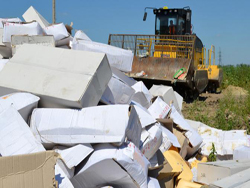930×609
Russia’s introduction of sanctions and restrictions on import of Turkish vegetables and fruits are unlikely to have reached their “educational” purposes, I guess at the Russian Academy of national economy and public administration (Ranepa).
In Turkey from the embargo, the most affected producers of cucumbers, which are unable to redirect their products to other countries. But the producers of tomatoes and other vegetables, according to the Academy shifted to other markets, such as Belarus and Azerbaijan.
Russia has paid for government-imposed sanctions, rising prices for some items, experts say. Vegetables that it imports from other countries were more expensive than Turkish products. Especially notable is the effect of the embargo in the winter months when the supply of own production in Russia is limited.
Only in Russia annually produces about 117 pounds of vegetables per person. The country thus imports to about 20 pounds per person. Only a year in Russia consumes about 126 kilograms of vegetables per person.
The decision on introduction of embargo on deliveries of a number of Turkish goods to Russia, the government adopted late last year after the incident with the Russian su-24 was shot down by the Turkish side.
For 2016, Russia continued to restrict the import of vegetables from Turkey, explaining that phytosanitary reasons. Thus have been restricted the importation of pepper, pomegranate, eggplant, zucchini and pumpkins, are not embargoed.
Prior to the adoption of restrictions Russia was largely dependent on supplies from Turkey, tomatoes, grapes and tangerines, which has a significant share in the market. Often the prices of some Turkish goods was lower than in Russia.
In Ranepa doubt the effectiveness of the “educational” nature of the sanctions imposed against Turkey or other countries. Due to the devaluation of the ruble in Russia sharply increased import products, and the Russians have sharply reduced demand. This put at a disadvantage all importers and limited the effect of the sanctions. In a disadvantageous position were all trading partners of Russia.
Among those who benefited from the sanctions, was Belarus. Despite the similarity of climatic conditions, the country has increased in Russia in the supply of many heat-loving crops, including cherries, kiwi and strawberries. In parallel, the country increased its imports of many fruits and vegetables, which, most likely, evidence of re-export.
Tomatoes
In 2015, according to Ranepa, Turkey accounted for 57.7% of import of tomatoes in cost terms. In 2016, tomatoes from Turkey to Russia could not be imported. Place Turkey occupied Morocco, which had 56.6% of the physical volume of deliveries this year. Increased exports to Russia this year, Azerbaijan, Egypt and China.
Products of all these countries is more expensive Turkish tomatoes. Tomatoes from Morocco, according to the calculations of the Ranepa, was 47% more expensive than Turkish.
While the Turkish producers of tomatoes were able to shift exports to other countries, experts say. After the embargo, the country sharply increased its exports of tomatoes to Belarus, Azerbaijan and Israel. In Ranepa write that Turkey increased its supply to countries that are actively cooperating with Russia.
Eggplant, zucchini and pumpkin
The ban on the importation of eggplant, zucchini and pumpkin from Turkey were introduced in may this year for phytosanitary reasons. While it is unlikely that these restrictions will seriously affect the Russian market, as Turkish summer vegetables are not popular. They are more expensive than vegetables grown in Russia and nearby countries.
In 2015 in Russia from Turkey were imported 5.1 thousand tons of eggplant. Three months of this year, 528 tons. Turkey’s share in the weight volume of imported eggplant decreased from 26% in 2015 to 19% in 2016. While the Turkish eggplants in recent years has risen significantly, as the supply on the market remains limited because of the embargo imposed by Russia against European countries.
Delivery eggplants in Russia sharply increased Belarus, which last year imported them two times more than Turkey. However, the eggplant in Belarus almost did not grow – in parallel to increased imports.
Turkey is also the main importer to Russia zucchini and pumpkin, but mostly Russia itself provides these vegetables. Therefore, the introduction of the ban on Russian consumers will hardly be affected, according to the Academy. The same applies to Turkish producers, which will easily be able to re-Orient their deliveries, confident in the Ranepa.







